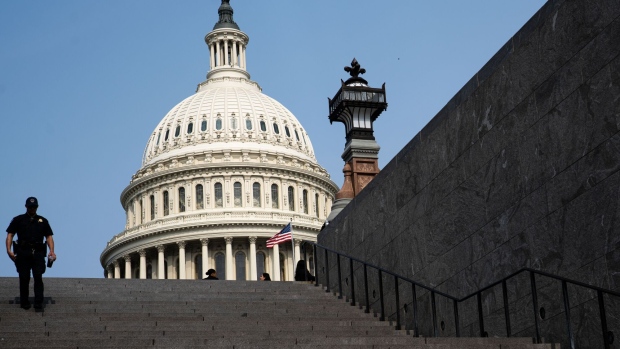May 25, 2023
Emerging US Debt Deal Would Raise Limit, Cap Spending for Two Years
, Bloomberg News

(Bloomberg) -- Republican and White House negotiators are moving closer to an agreement to raise the debt limit and cap federal spending for two years, according to people familiar with the matter, as time grows short to avert a catastrophic US default.
US stocks rose early Friday as traders weighed the reports of an emerging deal against strong economic data pointing toward another Federal Reserve interest-rates increase. Yields on Treasury bills maturing in early June tumbled, a sign investors are regaining confidence in on-time repayment during the window when a US default would be likely without a deal.
The two sides have narrowed differences in talks over recent days, according to the people, though the details agreed to are tentative and a final accord is still not in hand. The two sides have yet to agree on the amount of the cap.
Under the terms of the emerging agreement, defense spending would be permitted to rise 3% next year in line with President Joe Biden’s budget request.
Early Friday, Deputy Treasury Secretary Wally Adeyemo warned that payments to Social Security beneficiaries, veterans and others would be delayed if there’s a default. But he said he’s gaining some confidence an agreement will be reached.
“We’re making progress and our goal is to make sure that we get a deal because default is unacceptable,” Adeyemo said in an interview on CNN. “The president has committed to making sure that we have good-faith negotiations with the Republicans to reach a deal because the alternative is catastrophic for all Americans.”
The accord would also include a measure to upgrade the nation’s electric grid to accommodate renewable energy, a key climate goal, while speeding permits for pipelines and other fossil fuel projects that the GOP favors, people familiar with the deal said.
The deal would cut $10 billion from an $80 billion budget increase for the Internal Revenue Service that Biden won as part of his Inflation Reduction Act. Republicans have warned of a wave of agents and audits while Democrats said the increase would pay for itself through less tax cheating.
What is taking shape would be far more limited than the opening offer from Republicans, who called for raising the debt ceiling through next March in exchange for 10 years of spending caps. House conservatives were already balking Thursday at the notion of a small deal, with the House Freedom Caucus sending a letter to McCarthy demanding he hold firm.
An adviser to the House Democratic leadership said the White House had not shared any word about agreements on spending caps or IRS funding.
Read More: Modeling US Debt-Ceiling Risk as Talks X-Date Nears
“We know where our differences lie,” House Speaker Kevin McCarthy told reporters at the Capitol, adding that he planned to work through the holiday weekend there.
“We do not have an agreement yet. We knew this would not be easy. It’s hard, but we’re working. And we’re gonna continue to work till we get this done,” he said.
Read more: McCarthy Vows to Work Through Long Weekend on Debt Deal
Should a deal be reached soon, Tuesday is emerging as the likely day for a House vote. The Senate would then have to act quickly to send it to Biden’s desk before June 1, the date by which Treasury Secretary Janet Yellen has said her department could run out of cash.
The following day sees a payment due to millions of Social Security beneficiaries, putting pressure on politicians to resolve the impasse.
Fitch Ratings Wednesday placed the AAA credit rating for the US on watch for a potential downgrade. The US lost its AAA grade at S&P Global Ratings during a similar partisan standoff on the debt ceiling in 2011.
--With assistance from Viktoria Dendrinou, Jarrell Dillard, Steven T. Dennis, Erik Wasson, Josh Wingrove, Jennifer Jacobs, Constantine Courcoulas and Laura Litvan.
(Updates with markets in second paragraph)
©2023 Bloomberg L.P.






